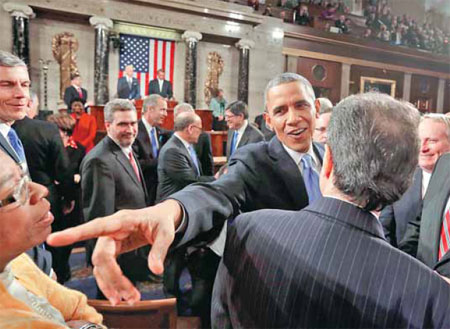Obama outlines foreign policies
US president calls diplomacy best way to solve thorny problems
US President Barack Obama explained key foreign policy positions in his fifth State of the Union address on Jan 28, expressing opposition to new sanctions against Iran while vowing to press ahead with the planned troop withdrawal from Afghanistan.
Addressing a joint session of both chambers of Congress, Obama reiterated he would veto any new sanctions bill against Iran while world powers negotiated with Teheran on a comprehensive deal on its nuclear programs.
As the United States winds down its military role in Afghanistan, he challenged the Afghan government to sign a security pact allowing for a limited US military presence in the country.
Obama also warned the threat of al-Qaida had evolved, with its affiliates and other extremists taking root in different parts of the world, highlighting hot spots such as Yemen, Somalia, Iraq and Mali.
In "a world of complex threats", the president promised to seek diplomatic means to ensure US leadership and security, expressing his opposition to large-scale military deployments overseas.
'Give a chance'
Obama also vowed to continue to focus on the Asia-Pacific region, where the United States seeks to support its allies and shape a future of "greater security and prosperity".
Since world powers reached a landmark interim nuclear deal with Iran in November, Obama has on a number of occasions urged Congress to refrain from imposing new sanctions on the Islamic republic for fear of torpedoing delicate talks on a final accord.
"If this Congress sends me a new sanctions bill now that threatens to derail these talks, I will veto it," Obama said.
He called on lawmakers to "give diplomacy a chance to succeed", saying it was diplomacy, backed by pressure, that had halted the progress of Iran's nuclear program and rolled parts of it back for the first time in a decade.
If Iran's leaders did not seize the opportunity of negotiations, Obama said, he would be the first to call for more sanctions and stand ready to "exercise all options" to make sure Iran did not build a nuclear weapon.
The president also admitted the talks would be "difficult" and "may not succeed", as the mistrust between the United States and Iran "cannot be wished away".
Any long-term deal on Iran's nuclear program must be based on verifiable action that convinces Washington and the international community that Tehran is not building a nuclear bomb, Obama said.
Obama pledged to press ahead with the planned troop withdrawal from Afghanistan by the end of the year.
"Together with our allies, we will complete our mission there by the end of this year, and America's longest war will finally be over," the president said.
"If the Afghan government signs a security agreement that we have negotiated, a small force of Americans could remain in Afghanistan with NATO allies," he said.
The Obama administration threatened to pull out all American troops at the end of the year after Afghan President Hamid Karzai refused to sign a bilateral security agreement that allows for and grants legal immunity to residual American troops, who will be tasked with training and assisting Afghan forces, as well as conducting counterterrorism operations beyond 2014.
"After 2014, we will support a unified Afghanistan as it takes responsibility for its own future," Obama said.
Obama ordered all US forces to leave Iraq in late 2011 after Baghdad failed to ink a similar security pact with Washington. Karzai has set new conditions for his signing of the deal, including a Washington promise not to allow its forces to conduct counterterrorism raids on Afghan homes, and an agreement to free Afghan prisoners held at the US Guantanamo prison.
Other episodes, among them Kabul's release of prisoners seen as "dangerous criminals" by Washington, have contributed to chilled bilateral relations.
|
US President Barack Obama talks with members of Congress after delivering his State of the Union speech in Washington on Jan 28. Larry Downing / Reuters |
(China Daily 01/30/2014 page12)















